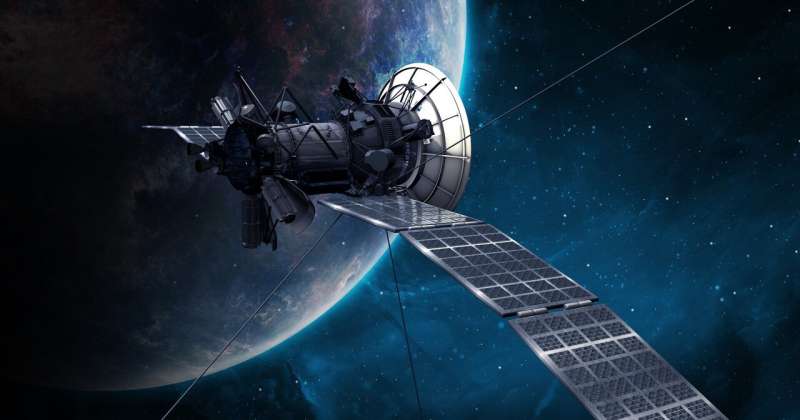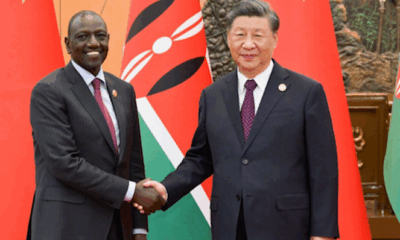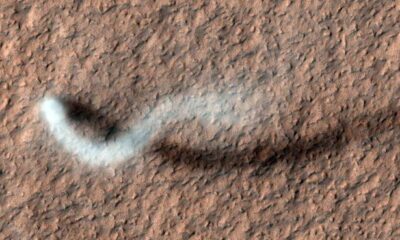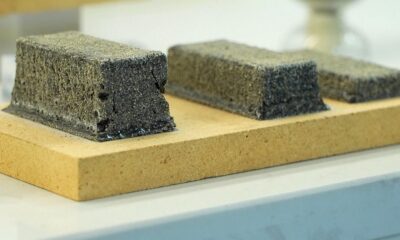Science
Scientists Prove Uplink Quantum Signals to Satellites Are Feasible

Research conducted by a team at the University of Technology Sydney has demonstrated the feasibility of sending quantum signals from Earth to satellites, a breakthrough that could revolutionize quantum communication. Published in the journal Physical Review Research, the study addresses the previously perceived limitations of uplink transmission, paving the way for advanced quantum networks.
Current quantum satellites, such as the Micius satellite launched by China in 2016, primarily transmit entangled particles of light from space to ground stations, facilitating ultra-secure communications. The recent research, led by Professor Simon Devitt and Professor Alexander Solntsev, indicates that it is indeed possible to transmit signals upward from Earth to a satellite, overcoming significant barriers that once hindered this approach.
Overcoming Challenges in Quantum Communication
The study titled “Quantum entanglement distribution via uplink satellite channels” highlights the potential for ground station transmitters to provide greater power and reliability. By generating stronger signals, these transmitters could support future quantum computer networks using satellite relays.
“Current quantum satellites create entangled pairs in space and send each half down to two locations on Earth—a process known as a ‘downlink,’” explained Professor Solntsev. “This has primarily been utilized for cryptography, where minimal photons are needed to create a secret key.” The concept of sending entangled pairs from ground stations to satellites, termed “uplink,” was previously dismissed due to concerns about signal loss, interference, and scattering.
Professor Devitt elaborated, “The idea is to send two single particles of light from separate ground stations to a satellite orbiting at an altitude of 500 km and traveling at approximately 20,000 km/h. The challenge is to achieve perfect alignment for quantum interference. Surprisingly, our models indicate that this uplink is indeed feasible.”
Future Implications for Quantum Networks
The researchers propose that this uplink concept could be tested soon using drones or balloon-mounted receivers. This development could lead to the establishment of quantum networks across countries and continents utilizing small, low-orbit satellites.
“A quantum internet represents a significant evolution from current cryptographic applications. While it operates on the same principles, it requires a larger volume of photons—more bandwidth—to connect quantum computers effectively,” stated Professor Devitt. “The uplink method could facilitate that bandwidth, as the satellite only needs a compact optical unit to manage incoming photons and report results. This approach minimizes costs and size, enhancing practicality.”
Looking ahead, Professor Devitt envisions a future where quantum entanglement is as ubiquitous as electricity. He said, “In time, quantum entanglement will function as a commodity that powers various technologies. Users will interact with quantum devices that connect to an entanglement source, similar to how we currently plug in our appliances.”
This project exemplifies the collaborative efforts between the UTS Faculty of Engineering and IT and the Faculty of Science, showcasing how interdisciplinary teamwork can address complex technological challenges.
For more details, refer to the study by S. Srikara et al., titled “Quantum entanglement distribution via uplink satellite channels,” available in Physical Review Research. The DOI for the article is 10.1103/v3p1-kz4h.
-

 Entertainment3 months ago
Entertainment3 months agoAnn Ming Reflects on ITV’s ‘I Fought the Law’ Drama
-

 Entertainment4 months ago
Entertainment4 months agoKate Garraway Sells £2 Million Home Amid Financial Struggles
-

 Health3 months ago
Health3 months agoKatie Price Faces New Health Concerns After Cancer Symptoms Resurface
-

 Entertainment3 months ago
Entertainment3 months agoCoronation Street’s Carl Webster Faces Trouble with New Affairs
-

 Entertainment3 months ago
Entertainment3 months agoWhere is Tinder Swindler Simon Leviev? Latest Updates Revealed
-

 Entertainment4 months ago
Entertainment4 months agoMarkiplier Addresses AI Controversy During Livestream Response
-

 Science1 month ago
Science1 month agoBrian Cox Addresses Claims of Alien Probe in 3I/ATLAS Discovery
-

 Health4 months ago
Health4 months agoCarol Vorderman Reflects on Health Scare and Family Support
-

 Entertainment4 months ago
Entertainment4 months agoKim Cattrall Posts Cryptic Message After HBO’s Sequel Cancellation
-

 World2 weeks ago
World2 weeks agoBailey Announces Heartbreaking Split from Rebecca After Reunion
-

 Entertainment3 months ago
Entertainment3 months agoOlivia Attwood Opens Up About Fallout with Former Best Friend
-

 Entertainment2 weeks ago
Entertainment2 weeks agoCoronation Street Fans React as Todd Faces Heartbreaking Choice





















